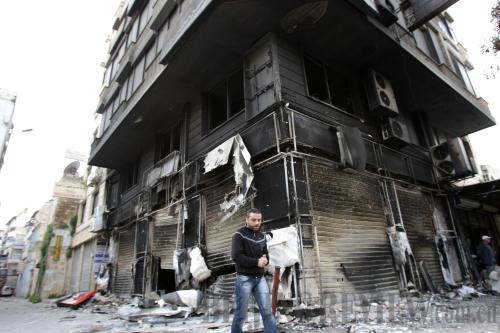|
 |
|
PROPERTY IN RUINS: A man passes a burnt building on March 27 in north Syria's port city of Latakia, where armed gangs took positions on rooftops across the city (XINHUA/AFP) |

The Syrian domino has finally fallen, joining many other Arab and Middle East nations embroiled in unrest. Demonstrations burst out in southern Syria in mid-March, and rapidly spread to other areas. On April 25, Syrian troops entered the southern city of Daraa. This action was considered a turning point. Four days later, U.S. President Barack Obama launched new sanctions against Syria, decrying human rights violations. The EU also imposed sanctions on May 9.
A political crisis
Two factors caused Syria's political crisis: regional instability and domestic conflicts.
Regional turmoil started in Tunisia and soon spread to Egypt, Bahrain, Libya and Yemen. Like in those countries, demonstrations in Syria were led by opposition groups and triggered by concerns over people's livelihoods.
Syria has a rigid political system. The current Syrian president and his father have administered the country for the last 41 years: Bashar al-Assad has run the country for 11 years, and his father, Hafez al-Assad, ruled for 30 years. State power has been monopolized by the al-Assad family and the Alawis, a group of Shiite Muslims. This political system leaves few opportunities for social elites to participate in state administration. Therefore, they are desperate to push for political reforms.
Also, the Syrian Government declared a state of emergency in 1963, which allowed arrests of suspected people without trial and restricted public gatherings, causing accumulated public resentment.
Moreover, slow economic development, inflation and high unemployment continue to plague Syria, where 32 percent of the population lives below the UN poverty line, earning $2 a day or less. Low incomes, low social welfare benefits and a low happiness index have led to serious social problems.
To comfort its people, the Syrian Government had to answer demonstrators' calls for reforms. Bashar al-Assad dismissed the cabinet on March 29, agreed to end the state of emergency on April 19, dissolved the Supreme State Security Court—a special court that existed outside the ordinary criminal justice system—and issued 15 other measures to appease the public while promising more.
However, it was too little, too late. The opposition insisted that demonstrations should not end until the government releases political prisoners, allows for freedom of speech and implements a multi-party system.
The political and social turmoil in Syria is deeply rooted in internal problems, and political and social reforms are essential to end the crisis.
U.S. worries
The Syrian military suppressed protesters at the government's bidding, much like in Libya. Although Western countries including the United States criticized the Syrian Government's excessive use of military force, they did not plan military intervention like the one against Libya.
U.S. President Barack Obama seems not to be interested in military intervention in Syria. Also, Obama is worried that with Bashar al-Assad out of the picture, Islamic extremists might come into power in Syria as they did during the 1979 Iranian Revolution, which vexed the United States, believing it could be the unintended consequence.
Syria is the only Arab country that maintains a close relationship with Iran. It exerts great pressure on the West along with Iran, Lebanon's Hezbollah and the Palestinian Islamic party Hamas. Considering the geopolitical environment, a military attack against Syria would elicit assistance from Iran, Hezbollah and Hamas, exacerbating an already chaotic situation. Given these considerations, the United States and other Western countries have to turn a blind eye to the Syrian military's suppression of demonstrators. Instead of striking a match, they must wait patiently as the situation unfolds.
Washington's new sanctions are unlikely to prevent the Syrian Government from suppressing demonstrations. U.S. sanctions against Syria have been in place since 2004, with limited success in creating a rift between Syria and its Middle East allies. Now able to resist U.S. sanctions, Syrian officials do not fear new ones. Besides, the United States barely has any economic influence over Syria, so its sanctions do not pose a credible threat.
The attitude of the United States is crucial to the future situation of Syria. For President Obama, now is not a good time to attack Syria. On one hand, he is not sure about the Syrian president's attitude toward reforms. On the other hand, the United States has limited economic interests in Syria. There is little possibility for the United States or other Western countries to wage a war in Syria.
| 